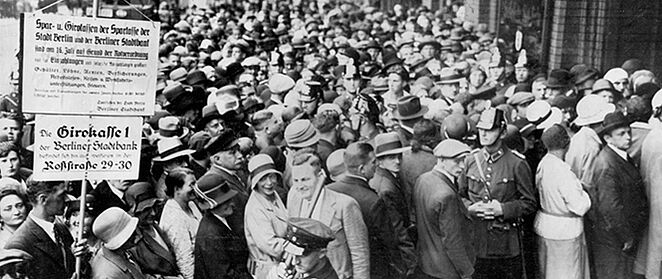SAVING IN TIMES OF CRISIS? 200 YEARS OF THE CULTURAT AND ECONOMIC HISTORY OF SAVING
6 AND 7 APRIL 2017

A conference of Deutsches Historisches Museum in cooperation with Berliner Sparkasse
The 200th anniversary of the founding of the Berliner Sparkasse (Berlin Savings Bank) as a public-sector company with a social mandate provides the occasion to examine various aspects of the topic of saving within the framework of a special exhibition of the Deutsches Historisches Museum (16 March to 19 August 2018). In preparation for the exhibition, a conference will be held on 6 and 7 April 2017 in the Max Liebermann House right next to the Brandenburg Gate.
From the very beginning saving had a dual character. On the one hand, it functioned for a long time as an important instrument to help prevent poverty and a means of financing individual consumption. On the other, it always served to achieve economic and socio-political objectives. Saving relieved the social security systems, disciplined the savers and helped to finance economic growth, but also wars. Saving is still the subject of discussion in the present. This applies to state savings policies as well as to individual saving in times of low interest rates. A closer examination of these current debates quickly reveals that we will learn little about saving unless we view it through an international perspective. On this basis the conference will offer the opportunity to explore the phenomenon of saving in the past, present and future with the help of specialised lectures and discussions.
Location: Max Liebermann Haus, Pariser Platz 7, 10117 Berlin
Conference languages: German, English (simultaneous interpretation available)
Registration
Due to the limited number of seats registration is required. Last date for registration: 30 March 2017
Fax +49 (0)30 20 30 4-412
tagungsbuero@dhm.de
PROGRAMM
Thursday, 6 April 2017
1.00 pm Get-together with buffet
2.00 pm Opening and welcome
- Ulrike Kretzschmar (Acting President, DHM, Berlin) and
- Kai Uwe Peter (Managing Director Sparkassenverband Berlin)
2.30 pm Introduction
- Robert Muschalla (Curator of the exhibition, DHM, Berlin)
Panel 1: The economic and social history of saving
2.45 pm Fundaments of the Social and Economic History of Saving and Savings Institutions in the 19th and 20th Centuries
- Günther Schulz (Rheinische Friedrich Wilhelms-Universität Bonn)
3.15 pm A penny is a very small matter – the savings movement in the United Kingdom from Ruthwell to retail
- Michael Moss (University of Northumbria)
3.45 pm Discussion
4.15 pm Coffee break
Panel 2: The cultural and educational history of saving
4.45 pm Saving in Literature
- Heike Gfrereis (Universität Stuttgart)
5.15 pm Savings Movements in the Last Third of the 19th Century: children, school savings banks and politics
- Sandra Maß (Georg-Eckert-Institut, Leibniz-Institut für internationale Schulbuchforschung, Braunschweig)
5.45 pm Discussion
6.15 pm Break
6.30 pm Evening lecture by Carl-Ludwig Thiele (Executive Board of the Deutsche Bundesbank) 'The Importance of Cash as a Store of Value'
Friday, 7 April 2017
Panel 3: Saving in times of crisis
10.00 am The Importance of Saving for National Socialist Economic and Social Policies
- Johannes Bähr (Goethe-Universität Frankfurt am Main)
10.30 am British savings institutions, saving and financial crises
- Richard Roberts (King’s College London)
11.00 am Discussion
11.30 am Coffee break
Panel 4: The present and future state of saving
12.00 noon Why America spends while Europe saves: A history
- Sheldon Garon (Princeton University)
12.30 pm Saving and Old-Age Provision in Times of Demographic Change
- Axel Börsch-Supan (Max-Planck-Institut für Sozialrecht und Sozialpolitik, München)
1.00 pm Final Discussion: Is It Still Sensible to Save in Today’s World and in the Future?